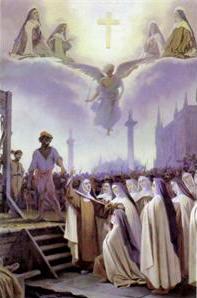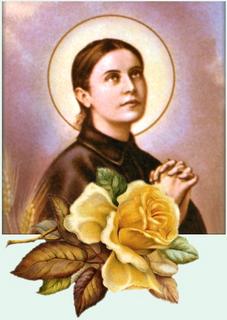
Saints and Martyrs
As we have seen the French revolution was to lead to untold inhumanity against man, but also it was a direct attack on the Church itself and it struck at the heart of the Church in our Priests and Religious, in which many suffered Martyrdom.
Instead of a revolution that freed the poor from the oppression of poverty it instead, was a tyrannical and obscene political movement. For if one is either rich or poor we are all children of God, and murder is never acceptable to solving social problems!
As the people reeled from one disaster to the next in this blood thirsty landscape where no amount of blood shed could quench the lust of the murderers, for in their blood lust these killers spared no one! The persecution of the Catholic Church in France is almost unequalled, in the annals of history.
But no matter the political turmoil or the unrest of the people, the Church stands Strong and firm, including both Priests and Religious!
So when the 'new' law of France was declared that of liberty it was to be in a perverted sense, in that many stormed the Monasteries and Convents to 'release' the 'imprisoned' in order to 'enlighten' these Holy men and women to this amazing freedom, which was simply a form of enchainment to the State! And when they in turn informed the officials that they were already free in their Love for Christ, many officials took this as a provocation to their 'new world order' in their 'enlightened age'.
So we come to the Carmelite Sisters of Compeigne, who had fled persecution in England only to find it arriving on their doorstep once they arrived in France. In themselves these holy Sisters were quite ordinary souls they lived their religious vocation as devoutly and as humbly as they could, and prayed for peace in France. They tried to obey the civil authorities, despite the obnoxious way their Rule of Life was treated!
These most Holy Nuns also kept prayer vigils for all those suffering under this terrible persecution and offered themselves as victim souls in expiation against the terrible sins being committed against the Church, God and their fellow man.
Perhaps this was too much for these 'brave' men of the revolution who when hearing of the Nuns devotion to the Sacred Heart of Jesus had the Nuns of Compiegne arrested! Obviously by their very pious and humble prayers they were considered 'provocateurs'!
And in this bloody thirsty generation it seemed their blood lust was still not appeased and so these innocent and Holy Nuns were arrested on trumped up charges. What was their crime? The officials found portraits of Jesus of the Sacred Heart, these Nuns were then deemed enemies of the peoples, and they faced their trial which was a kangaroo court of mere thugs and degenerates!
The Nuns of Compiegne were accused of being 'parasites' and of being 'deluded' in that they these revolutionaries were more enlightened than to actually believe that God existed, for these degenerates God NO longer existed but their perverse Law did!
But these Holy Nuns were not silent against such a gross injustice, and it would be Mother Henriette who upon handing these officials her written statement they then read it aloud, "How false are the judgments that the world makes of us! Its profound ignorance disapproves of our promises; all that it adorns itself with is but pure vanity. Its only reality is the sorrow that devours it. I despise its pride, I consider its hatred an honour; and I prefer my chains to its spurious freedom. O day of eternal celebration, O day forever holy, when, vowing myself to Carmel I won the heart of God. O beloved and precious bonds I strengthen you each day; all that the earth can offer me is worthless in my eyes; your sarcasm, worldlings, compared to my joy is a dead giveaway: that joy outweighs all the cares to which your soul is prey."
This declaration of their love for God and many other devout nuns praising God were enough for the 'Judge' to pass judgement and that was death by guillotine!
Many of these Holy Nuns went to the guillotine singing songs of Praises to God on High but also for mercy to those who were to martyr them. These heroic Nuns truly had their prayers heard and died for the expiation of many who were committing horrendous and barbarous acts in the name of 'liberty'!
These Holy Nuns of Compiegne died in 1794.
They were beatified in 1906 by Pope Pius X.
Peace of Christ to you ALL
Copyright © 2005 Marie Smith. All rights reserved.



